Japan PM Shinzo Abe to alter law to allow emergency declaration over COVID-19 outbreak
09 March, 2020

Japan is defined this week to revise a good law allowing Primary Minister Shinzo Abe to declare a formal state of crisis above the coronavirus, if needed, while Abe faces persistent criticism for his handling of the outbreak ahead of the Tokyo Olympic Games.
In conceivably his biggest test since time for office in 2012, Japan's longest-serving primary minister has come under fire for what critics have named an initial lack of leadership, followed by abrupt steps like institution closures that left parents and employers scrambling.
Japan has a lot more than 400 conditions of the coronavirus. Furthermore, about 700 conditions were confirmed on a cruise liner quarantined near Tokyo previous month.
NHK reported the quantity of infections in Japan had hit 483 by 11.30am on Mon, citing official data, with three cases reported early in the day.
Fourteen people have passed away, including seven from the liner. The virus features spread rapidly all over the world, with an increase of than 100,000 confirmed instances and 3,600 deaths.
Among criticisms is that Abe's government was too gradual to put curbs in visitors from China - an integral source of monetary growth - after the outbreak originated there later this past year. In a new opinion poll, 50 per cent explained they didn't approve of Abe's handling of the outbreak, versus 37 % who said they did.
Commentators also have said Japan has lacked sufficient capacity to check for the virus, even though failing to mobilise what potential it has, resulting in suspicions that the virus is spreading faster than data display. Vigorous screening programmes in countries like South Korea contain detected high amounts of infections.
Speculation - denied by organisers - is swirling that the global outbreak can scupper Japan's dream of hosting the Tokyo Olympics, an end result that could are more likely if circumstances of crisis is declared.
"I want the Olympics to achieve success more than anyone, however the negative elements are increasing," Yoichi Masuzoe, a good former Tokyo governor who was simply health minister throughout a 2009 influenza epidemic, told Reuters.
In its most recent move, the government plans on Tuesday to submit to parliament a bill to revise a 2012 law, enacted following the 2009 epidemic, so that it can be put on the coronavirus if necessary. Parliament is likely to sign off on Fri.
The 2012 law was enacted while Abe's Liberal Democratic Get together was in opposition. Officials include said it might not be employed to the coronavirus without alterations, although opposition get-togethers and other critics say reinterpreting it really is enough.
"APPEAL TO THE GENERAL PUBLIC"
The law would allow prime minister declare an official state of emergency if the disease poses a "grave danger" to lives and if its rapid spread could have an enormous effect on the economy. The influence of the virus outbreak has already been increasing Japan's threat of recession.
Governors in hard-hit areas could then ask people to stay inside, close public features, expropriate land and buildings for medical features and request or order emergency transport of items. The state of crisis could last up to two years with a practical one year-extension.
In the virus-hit northern island of Hokkaido, the governor declared circumstances of emergency late last month, although he acknowledged there is not any legal basis to take action.
Abe has recently requested that schools nationwide close and large-scale events be pared back or perhaps cancelled.
"Abe could apply regulations by re-interpreting it. He's proficient at that," said Masahiro Kami, head of the Medical Governance Research Institute and a critic of the government's response.
Abe's government in 2014 controversially reinterpreted the post-war, pacifist constitution to now let troops fight abroad.
"He wants to appeal (to the general public) because things are not going very well," Kami explained. He added the virtually all urgent issue had not been further limits on general public activities, but beefing up virus screening and early treatment of elderly and different high-risk patients.
Abe has not clarified what exactly would trigger circumstances of emergency, repeating on Mon that the revision was to get ready for a "worst-case situation".
That has left most analysts thinking he's reluctant to do so for fear of scuppering the Olympics.
"I suspect Abe doesn't prefer to declare circumstances of emergency since it will be killing the Olympics himself," stated Koichi Nakano, political technology professor at Sophia University.
Source:
